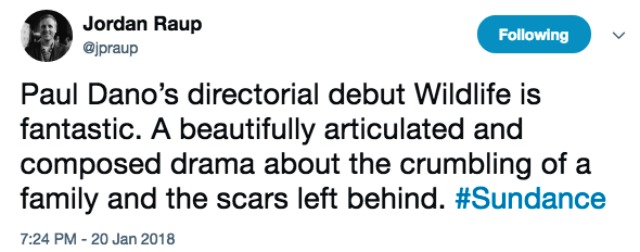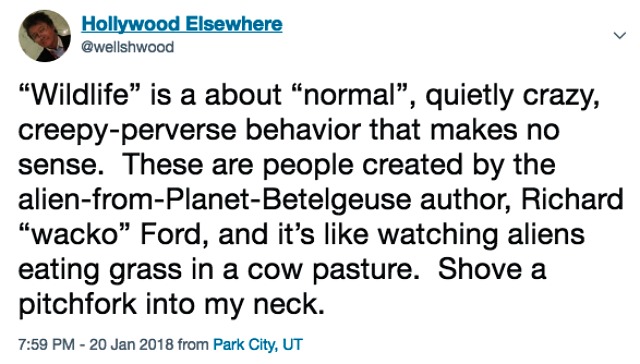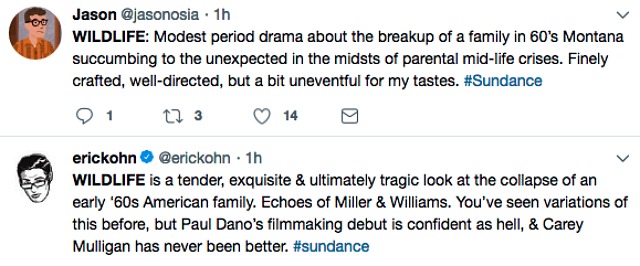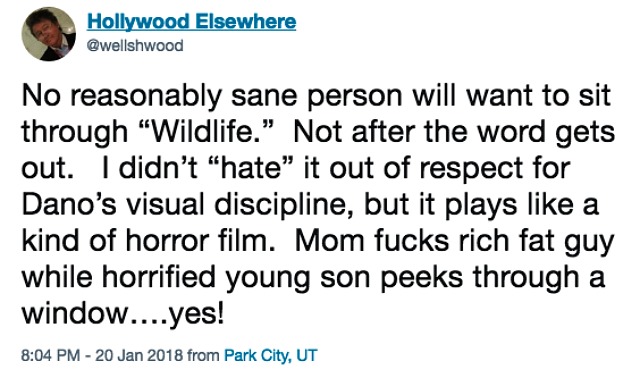In Paul Dano‘s Wildlife, which is screening in Cannes under the Critics Week banner, the great Carey Mulligan plays an anxious, self-loathing infidel. In a Variety piece that accompanies a video interview with Mulligan, Brent Lang calls it “the kind of warts-and-all role that [is] usually reserved for men.” It’s actually call it the kind of warts-and-all experience with a broken person that you regret the instant it’s over and you’re on your way out to the parking lot.
“You very rarely see women on screen who are being unfaithful,” Mulligan says. “It’s so rare to see a woman allowed to fail on screen.”
My 1.20.18 review, filed from Park City: “Wildlife is a sluggish but otherwise strongly directed middle-class horror film — cold, creepy, perverse.
“I didn’t hate it because of Dano’s visual discipline (handsome compositions, a restrained shooting style, extra-scrupulous 1960 period design) and because of Carey Mulligan‘s fascinating performance as a youngish cheating mom in a small Montana town. But it’s a funereal gloom movie, and it makes you feel like you’re sinking into a cold swamp.
“On top of which I was appalled — astonished — by the cruel, self-destructive behavior of this sad 34 year-old woman, whose name is Jeanette, and particularly by her decision to invite her 14 year-old son Joe (Ed Oxenbould) to almost participate in some extra-marital humping with a rich, small-town fat guy (Bill Camp) while her irresponsible husband Jerry (Jake Gyllenhaal) is off fighting a forest fire with local volunteers.
Yes, the screenplay (by Dano and Zoey Kazan) is an adaptation of a 1990 Richard Ford novel so blame Ford, right? But who dreams up stuff like this? And what kind of mother has ever injected this kind of sexually odious poison into her son’s life?
Infidels hide their affairs, particularly from their kids. But Jeanette more or less whispers in her son’s ear, “I dunno but I kinda like this balding Uriah Heep…he’s rich and definitely not your father, and so I’m feeling flirty and thinking about…well, I’ve said enough.” And the kid just stares at her like she’s some kind of conniving ghoul from a Vincent Price flick.
Later she says she’s miserable and almost ready to kill herself, but that doesn’t negate the earlier thing.
So Wildlife is partly admirable, yes, but mostly an endurance test. The feeling of watching it is something like “all right, this is grim and getting grimmer but I can handle it…I certainly love Mulligan and Gyllenhaal’s acting but Oxenbould…the kid is torture. He doesn’t look like Carey or Jake, of course — familial resemblance almost never happens in movies — but he wears the exact same expression in every scene in the film…a look of intimidation, anxiety, quiet horror, shock, dread…every damn scene.”
But Dano knows how to visually compose and hold to a certain austere style, and Mulligan is always peak-level, no matter the role.
Variety‘s Owen Gleiberman has said that Wildlife is “a feminist movie” because it depicts feelings of creeping futility and insanity in a reasonably intelligent mother a decade before feminism broke through, a woman slowly dying inside a bad marriage, wondering where it can all go or end. But fucking Bill Camp while your son is in the same house or in a car outside…my mother sometimes gave me a rough time when I was 14 but she never came close to this kind of sadism.




